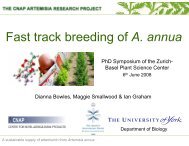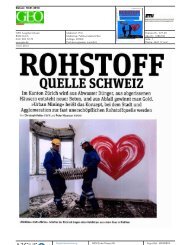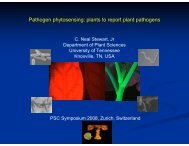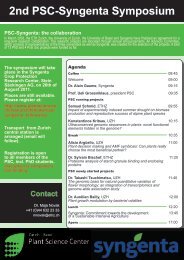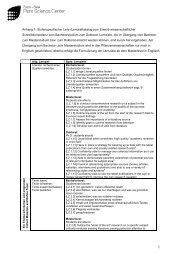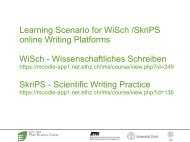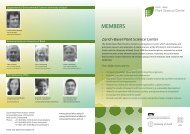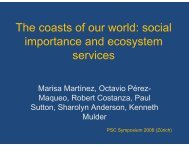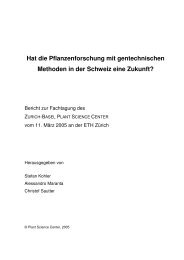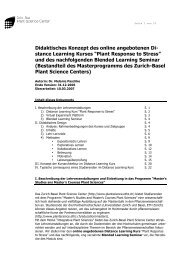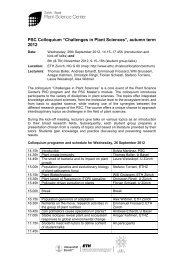Terrestrial Ecosystem Dynamics in a Changing World - Zurich-Basel ...
Terrestrial Ecosystem Dynamics in a Changing World - Zurich-Basel ...
Terrestrial Ecosystem Dynamics in a Changing World - Zurich-Basel ...
You also want an ePaper? Increase the reach of your titles
YUMPU automatically turns print PDFs into web optimized ePapers that Google loves.
Instruction Concept SPSW Summer School 2011-03-25<br />
<strong>Terrestrial</strong> <strong>Ecosystem</strong> <strong>Dynamics</strong> <strong>in</strong> a<br />
Chang<strong>in</strong>g <strong>World</strong><br />
Melanie Paschke, Ansgar Kahmen (authors/scientific organizers)<br />
1. Learn<strong>in</strong>g Objectives<br />
Student will,<br />
• be able to summarize the state of the art <strong>in</strong> research<br />
• be able to understand the contributions of other research communities<br />
• be able to identify future challenges<br />
Summer School Outcomes<br />
Prepare a summary report highlight<strong>in</strong>g future and cross-discipl<strong>in</strong>e challenges that we<br />
face <strong>in</strong> order to better understand “<strong>Terrestrial</strong> <strong>Ecosystem</strong>s <strong>in</strong> a Chang<strong>in</strong>g <strong>World</strong>”. It<br />
would be nice if such a report could be published at<br />
• SPSW Homepage and Newsletter<br />
• PSC Newsletter<br />
Possible Work<strong>in</strong>g Title: Future Cross-Discipl<strong>in</strong>e Challenges for Understand<strong>in</strong>g<br />
<strong>Terrestrial</strong> <strong>Ecosystem</strong> <strong>Dynamics</strong> <strong>in</strong> a Chang<strong>in</strong>g <strong>World</strong><br />
2. Organisations of Group Work<br />
Before summer school:<br />
• Students will need to read/browse the assigned literature before the summer<br />
school. Speakers make suggestions for 2 key papers l<strong>in</strong>ked to their<br />
presentation: together 12 PDFs.<br />
• Students prepare some questions they want to focus on dur<strong>in</strong>g the group<br />
work. Preparation of questions is guided by offer<strong>in</strong>g a general question<br />
framework (see po<strong>in</strong>t 5). Group enrollment before the summer school (see<br />
po<strong>in</strong>t 3)<br />
• Students prepare a poster of their own work for the poster session.<br />
Dur<strong>in</strong>g summer school:<br />
• Preparation (<strong>in</strong> the even<strong>in</strong>g of day 1): Establish student teams. 2) Give every<br />
student team some time to work <strong>in</strong> detail through the literature of their<br />
sessions and prepare their questions. Every team will be responsible to guide<br />
1 – 2 discussion(s) after sessions. This number is dependent from the number<br />
of students and number of teams that can be set up.<br />
• Discussion (after each session): Discussion is guided by one student team.<br />
Lecturers and all other students participate <strong>in</strong> the discussions. Questions<br />
follow the framework of po<strong>in</strong>t 5.<br />
• Group Work: All groups follow up discussion and draft a synthesis, i.e. a<br />
message.
• Presentation and <strong>in</strong>tegration: All groups br<strong>in</strong>g back their summaries to the<br />
plenum for discussion and <strong>in</strong>tegration. There is a vote on what is<br />
miss<strong>in</strong>g/should be done <strong>in</strong> future research and implementation.<br />
After summer school:<br />
• Prepare the summary report for publication (see “Outcomes”).<br />
3. Group Enrolment<br />
Every participant is asked to state their level of experience <strong>in</strong> plant molecular<br />
biology, plant physiology, plant ecology before the group enrolment. Participants are<br />
assigned to the groups by the organisers. Composition of student teams should<br />
reflect the number of participants from three research communities and their levels of<br />
experience. Favourably one student expert <strong>in</strong> the topic of each lesson will be able to<br />
peer-tutor the members from other discipl<strong>in</strong>es.<br />
4. General Question Framework:<br />
The discussion after each session should be structured by several possible<br />
questions:<br />
• Questions of understand<strong>in</strong>g<br />
• What is the state of the art <strong>in</strong> plant ecosystem dynamics <strong>in</strong> a chang<strong>in</strong>g world<br />
that was outl<strong>in</strong>ed <strong>in</strong> this session?<br />
• What is the specific contribution of researchers of a certa<strong>in</strong> community?<br />
• What are future challenges for the researchers of a certa<strong>in</strong> community<br />
regard<strong>in</strong>g the topic?<br />
• How important is the dialogue for this community with the other <strong>in</strong>volved<br />
communities?<br />
• How can the current knowledge on plant ecosystem dynamics be transferred<br />
<strong>in</strong>to action and implementation?<br />
5. Schedule with Focus on the Instructional Parts<br />
Tuesday 21 st june<br />
16:00-17:00: registration.<br />
17:00-18:00: Installation<br />
18:00-18:45: Apéro<br />
18:45-20:00: D<strong>in</strong>er<br />
20:00-21:30: Stefan Brönnimann, Climatic changes dur<strong>in</strong>g the past 100 years -<br />
approaches and results”, Oeschger Centre for Climate Change Research and<br />
Institute of Geography, University of Bern, Switzerland.<br />
21:30 – open end: Preparation - prepare literature and questions for the<br />
discussions after sessions (work <strong>in</strong> student teams)<br />
Wednesday 22 nd June<br />
8:00-8:45: Christian Kö
ner, “Leeway and constra<strong>in</strong>ts of plant and ecosystem responses to atmospheric<br />
change”, University of <strong>Basel</strong>, Switzerland.<br />
8:45-9:15: Discussion (moderated by group 1, plenum)<br />
9:15-9:45: Group work - preparation of summaries (all groups)<br />
9:45-10:00 Coffee break<br />
10:30-11:15: Presentation and <strong>in</strong>tegration - student presentations and vot<strong>in</strong>g<br />
(plenum)<br />
11:15-12:00: Oliver Bossdorf, "Epigenetics and plant responses to environmental<br />
change", University of Bern, Switzerland.<br />
12:00-12:30: Discussion (moderated by group 2, plenum)<br />
12:30-14:00 lunch<br />
14:00-14:30: Group work - preparation of summaries (all groups)<br />
14:30-15:15: Presentation and <strong>in</strong>tegration - student presentations and vot<strong>in</strong>g<br />
(plenum)<br />
15:15-15:45: coffee break<br />
15:45-16:30: Kentaro Shimizu, “Gene function <strong>in</strong> nature: toward predict<strong>in</strong>g plastic<br />
and evolutionary responses to chang<strong>in</strong>g environments”, University of Zürich,<br />
Switzerland.<br />
16:30 – 17:00: Discussion (moderated by group 3, plenum)<br />
17:00-17:30: Group work - preparation of summaries (all groups)<br />
17:30-18:15: Presentation and <strong>in</strong>tegration - student presentations and vot<strong>in</strong>g<br />
(plenum)<br />
18:15-18:45: handl<strong>in</strong>g poster + free time<br />
18:45-19:45: d<strong>in</strong>er<br />
19:45-22:00: Poster session<br />
Thursday 23 rd June<br />
8:00-8:45: Jürg Fuhrer, “Agricultural Crops and Climate Change”, Agroscope<br />
Reckenholz-Tänikon ART, Switzerland.<br />
8:45-9:15: Discussion (moderated by group 4, plenum)<br />
9:15-10:00: Group work - preparation of summaries (all groups)<br />
10:00-10:30 Coffee break<br />
10:30-10:45: Presentation and <strong>in</strong>tegration - student presentations and vot<strong>in</strong>g<br />
(plenum)<br />
10:45-11:30: Gian-Reto Walther, “Climate change impacts on biodiversity”, BAFU,<br />
Bern, Switzerland.<br />
11:30-12:00: Discussion (moderated by group 4, plenum)<br />
11:30-12:15: Group work - preparation of summaries (all groups)<br />
12:15-13:00: Presentation and <strong>in</strong>tegration - student presentations and vot<strong>in</strong>g<br />
(plenum)<br />
13:00-14:00: lunch (may be a picnic is possible, to be discussed with the hotel)<br />
14:30-17:30 Botanical excursion or free time<br />
18:30-20:00: d<strong>in</strong>er<br />
20:30-21.30: Sebastiaan Luyssaert, “<strong>Ecosystem</strong> management for climate change<br />
mitigation: the good, the bad and the ugly”, CEA, France.<br />
Friday 24 th June
8:00-8:45: Ansgar Kahmen, ETH Zürich, Switzerland (W<strong>in</strong>ners and losers <strong>in</strong> climate<br />
change)<br />
8:45-9:15: Discussion (moderated by group 5, plenum)<br />
9:15-10:00: Group work - preparation of summaries (all groups)<br />
10:00-10:30: Presentation and <strong>in</strong>tegration - student presentations and vot<strong>in</strong>g<br />
(plenum)<br />
10:30-11:15: Christophe Rand<strong>in</strong>, “Predict<strong>in</strong>g the fate of plant species <strong>in</strong> a chang<strong>in</strong>g<br />
world: provid<strong>in</strong>g safer projections and avoid<strong>in</strong>g pitfalls”, University of <strong>Basel</strong>,<br />
Switzerland.<br />
11:15-11:45: Discussion (moderated by group 6, plenum)<br />
11:45-12:30: Group work - preparation of summaries (all groups)<br />
12:30-14:00: Lunch<br />
14:00-14:45: Presentation and <strong>in</strong>tegration - student presentations and vot<strong>in</strong>g<br />
(plenum)<br />
14:45-15:30: Conclusion talk<br />
15:30-16:00: Questions<br />
16:00-16:30: Certificates and departure





